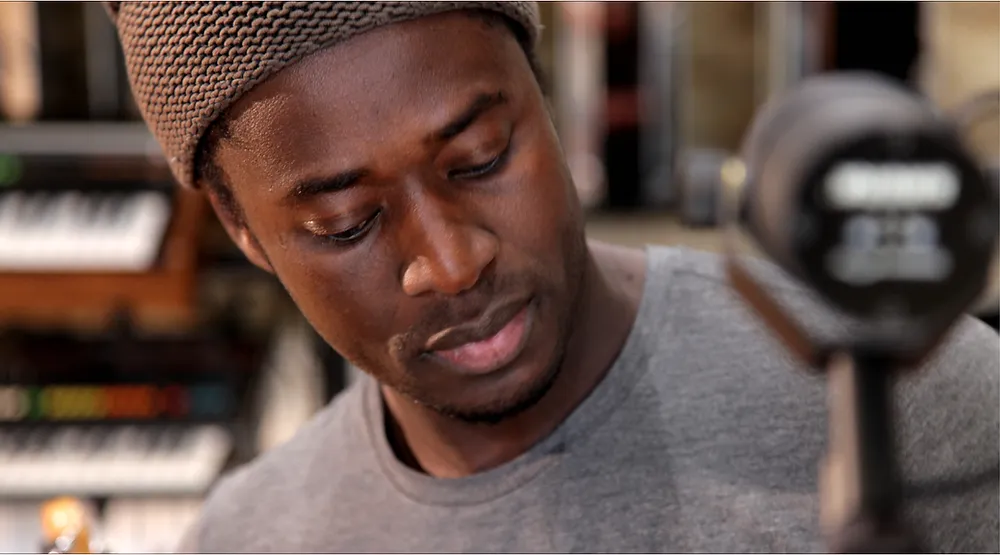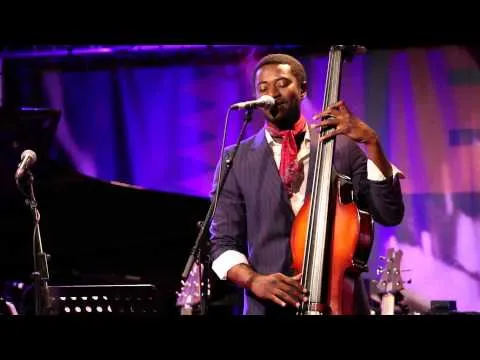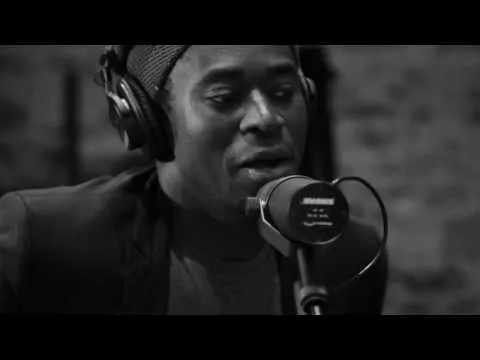


Ein Senegalese schmiegt sich an seine Wurzeln
Alune Wade is a Senegalese musician who, through his eclecticism and evident multicultural generosity, has established himself as a stalwart of jazz.
Alune Wade’s diverse and deeply entrenched musicianship is a critical component in reviving the African jazz scene. With his extraordinary musical talent, bassist, vocalist, and composer Alune Wade has taken it far beyond his Senegalese roots.
Alune Wade ist ein senegalesischer Musiker, der sich durch seinen Facettenreichtum und seine offensichtliche multikulturelle Vielfalt zu einer festen Größe des Jazz entwickelt hat.
Alune Wades vielfältiges und tief verwurzeltes musikalisches Können ist ein entscheidender Faktor für die Wiederbelebung der afrikanischen Jazzszene. Mit seinem außergewöhnlichen musikalischen Talent hat der Bassist, Sänger und Komponist Alune Wade den Jazz weit über seine senegalesischen Wurzeln hinausgeführt.

He takes a musical voyage from West Africa to North Africa via Ethiopia, guided by Arabic-Andalusian sounds, Berber music, and rhythms, blended with Afrobeat, Arabic oriental-melodic maqams, and jazz.
As he leads spectators on his very distinctive jazz voyage, whose soundscape sparkles with a polished urban finish, his calm authority and powerful strength on stage are displayed.
Er unternimmt eine musikalische Reise von Westafrika über Äthiopien nach Nordafrika, geleitet von arabisch-andalusischen Klängen, Berbermusik und -rhythmen, gemischt mit Afrobeat, arabisch-orientalisch-melodischen Maqams und Jazz.
Während er das Publikum auf seine ganz eigene Jazz-Reise mitnimmt, deren Klangwelt durch ein poliertes urbanes Finish glänzt, zeigt sich seine ruhige Autorität und kraftvolle Stärke auf der Bühne.

“Sultan,” Alune’s most recent album, is a real example of global music, linking Africa and the Middle East. With its distinctive rhythms and sounds borrowed from jazz, Afrobeat, and Berber music traditions, the record promotes multiculturalism.
This beautifully designed and perfectly delivered effort (Sultan) cements Wade’s status as one of the premier world music performers and is an early candidate for one of the greatest world music albums of the year.
"Sultan", das jüngste Album von Alune, ist ein echtes Beispiel für globale Musik, die Afrika und den Nahen Osten miteinander verbindet. Mit seinen unverwechselbaren Rhythmen und Klängen, die dem Jazz, dem Afrobeat und den Musiktraditionen der Berber entlehnt sind, fördert das Album den Multikulturalismus.
Dieses wunderschön gestaltete und perfekt umgesetzte Werk (Sultan) festigt Wades Status als einer der führenden Weltmusikinterpreten und ist ein früher Kandidat für eines der besten Weltmusikalben des Jahres.

38-year-old Alune Wade was born in Dakar on 9 June 1978. His father, a Paris-educated musician, is the leader of the Senegalese army's symphony orchestra. "At home, I listened to many types of music. My father, who was influenced by classical music, loved the Bach sonatas, for example. My mother, with other women from the neighborhood, had the house blasted with African songs and soul music. My sister introduced me to pop music, which came from America and Europe...".
Der 38-jährige Alune Wade wurde am 9. Juni 1978 in Dakar geboren. Sein Vater, ein in Paris ausgebildeter Musiker, ist Leiter des Symphonieorchesters der senegalesischen Armee. "Zu Hause habe ich viele verschiedene Musikrichtungen gehört. Mein Vater, der von der Klassik geprägt war, liebte zum Beispiel die Bach-Sonaten. Meine Mutter ließ mit anderen Frauen aus der Nachbarschaft das Haus mit afrikanischen Liedern und Soulmusik beschallen. Meine Schwester führte mich in die Popmusik ein, die aus Amerika und Europa stammte...".

In the end, however, it was the desire for the bass that won out. Electric bass, double bass, the instrument with the four bass strings seems to be a natural connection to Africa for him: "I am downright fascinated by the bass. It's a very African instrument with its fabulous rhythmic possibilities. It is the backbone of the orchestra and a valuable link between rhythm and harmony instruments.
Am Ende siegt dennoch das Bedürfnis nach dem Bass. E-Bass, Kontrabass, das Instrument mit den vier Basssaiten scheint für ihn eine natürliche Verbindung zu Afrika zu sein: "Ich bin regelrecht vom Bass fasziniert. Das ist ein sehr afrikanisches Instrument mit seinen fabelhaften rhythmischen Möglichkeiten. Er ist das Rückgrat des Orchesters und ein wertvolles Bindeglied zwischen Rhythmus- und Harmonieinstrumenten.

The variety for this instrument he seeks in the fingerboards of Stanley Clarke or Jaco Pastorius. In this context, however, Alune confesses to a role model, if not a passion, in the person of Marcus Miller: "I love his way, his feel, his touch of the strings. He has kept this whole personal world intact since his time with Miles."
Die Vielfalt für dieses Instrument sucht er in den Griffen von Stanley Clarke oder Jaco Pastorius. In diesem Zusammenhang bekennt sich Alune jedoch zu einem Vorbild, wenn nicht gar einer Leidenschaft, in der Person von Marcus Miller: "Ich liebe seine Art, sein Gefühl, seinen Anschlag der Saiten. Er hat sich diese ganze persönliche Welt seit seiner Zeit mit Miles bewahrt."


Those who are convinced that nothing could be better, may be right. But the alternative is not to be despised either. Therefore – see you next Sunday for the jazz matinee.
Wer überzeugt ist, besser geht nicht, der mag eventuell recht haben. Doch das Andere ist auch nicht zu verachten. Daher – bis zum nächsten Sonntag zur Jazz-Matinee.
